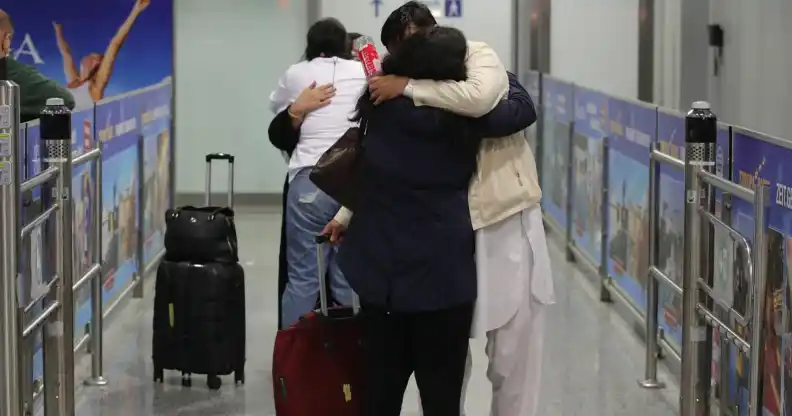This brave charity is helping desperate LGBT+ Afghans escape the brutal Taliban

Afghan evacuees arrive in Germany on 18 August 2021 after fleeing Kabul (Armando Babini/AFP/Getty)
As the Taliban completes its takeover of Afghanistan, brave charity Rainbow Railroad is working tirelessly to help LGBT+ Afghans flee the country.
The Rainbow Railroad is a global NGO providing aid and asylum to LGBT+ people around the world. Since its founding it’s helped more than 1,600 LGBT+ people find safety, including many victims of Chechnya’s “gay purge“.
It now offers a lifeline to LGBT+ Afghans – already a persecuted minority – who find themselves uniquely vulnerable as the Taliban fighters move in.
“I think what we’re going to see now, what we’re already seeing now, is a bit of a mass exodus,” said Kimahli Powell, the executive director of Rainbow Railroad, speaking to TIME.
“And so in the wake of things moving very quickly, I think we’re going to see LGBTQ persons be potential targets, which means more outreach to us. We are currently relying on our deep international network and our contacts within the country to try to reach more people.”
While the Taliban may attempt to present a more friendly face to the world by declaring an “amnesty” and urging women to join its government, it offers no such assurances to the LGBT+ community, who fear a return to brutal Sharia law death penalties.
This fear was confirmed last month when a Taliban judge told the German tabloid Bild that gay men would be executed by being crushed to death under a wall.
Rainbow Railroad has already received 50 requests for help in Afghanistan this year and anticipates a spike in the coming days and weeks, with many people “searching for solutions at a moment’s notice”.
LGBT+ Afghans desperate for help escaping Taliban but unable to access it
Rainbow Railroad uses “all tools at our disposal” to relocate those in need, but finding them is extremely difficult when so many of the community are deep in hiding.
Anyone who tries to promote LGBT+ rights is driven underground, and activists have to relocate often and change phones regularly, so keeping track of individuals is hard.
“LGBTQ organising is really limited in Afghanistan for multiple reasons, including Afghanistan being in a perpetual state of war and the criminalising of consensual same sex conduct. There’s limited human rights defenders to go to and there are limited organisations that provide support,” Powell explained.
“That’s the context in which Rainbow Railroad has been operating in the region. Key partnerships are huge for us in order to identify people who are at risk, and finding Afghans who are willing to even risk being on the Internet to disclose themselves as members of the LGBTQ community is really hard.”
Powell was understandably unwilling to describe the “loose collectives” Rainbow Road works with as this could put people’s lives at risk.
He predicts the biggest difficulty they’ll face in Taliban-controlled Afghanistan will be in finding safe spaces to organise and reach out to other people. “The key challenge is access to communication,” he said.
Outside help is crucial, whether that’s through donations or by holding governments accountable to support refugees.
“They’re going to need access to housing; they’re going to need access to emotional and mental health supports, they’re going to need access to resources,” Powell said. “I think that’s the opportunity for individuals, civil societies and governments to provide.”

